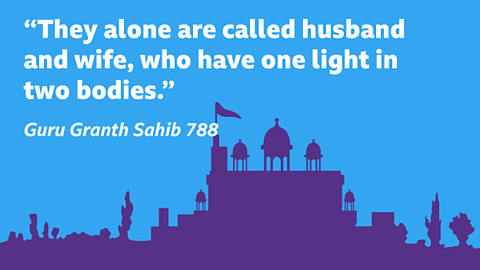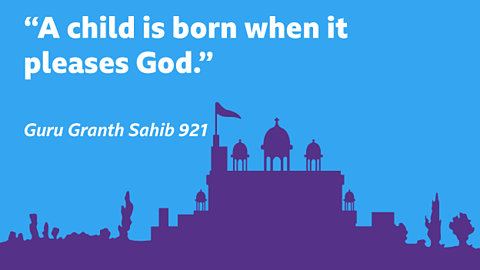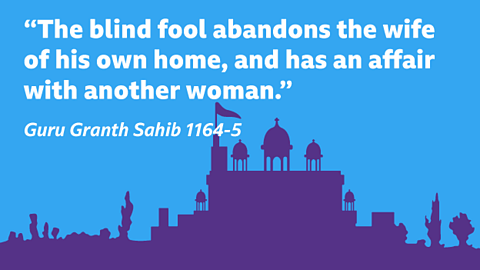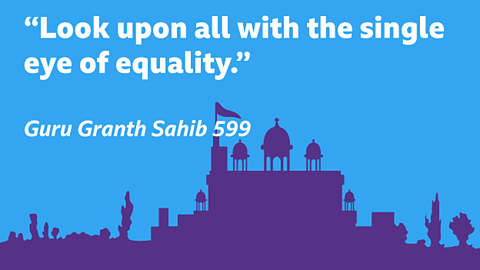Key points about issues of relationships
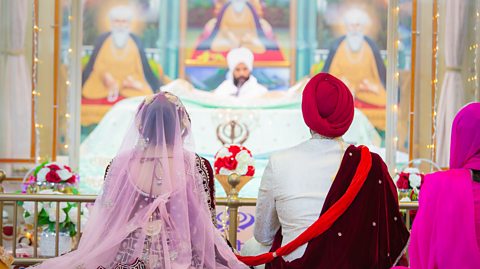
- Sikhi promotes the life of a householder and extended family living as the foundation of society.
- Most Sikhs see marriage as SanskaraA purification ceremony or rite. and an important part of life, however there are differing views on divorce and remarriage.
- The marriage ceremony is known as Anand Karaj, the ceremony of bliss. It must be held in the presence of Guru Granth SahibThe Guru Granth Sahib is the most important Sikh holy book. It is a collection of songs, prayers and hymns from the Sikh Gurus and other holy men, as well as teachings from other faiths. It is treated as a living Guru..
- The GurusSpiritual masters of Sikhism. taught that God made male and female to complete each other and procreate/procreationTo produce/the production of offspring by means of sexual reproduction. within marriage. Although some Sikhs accept the use of contraception in certain circumstances.
- Sikh teaching does not condemn a person’s sexual orientation, but many Sikhs believe that heterosexualHeterosexual is the word to describe people who are sexually attracted to people of the opposite gender. relationships are part of God’s plan.
- Sikhism teaches the complete equality of men and women.


Remember
Sikhs believe there is only one God, which is genderless and eternal. They refer to God as WaheguruSikhs believe in one God called Waheguru which means ‘Wonderful Lord’ or ‘Wonderful Teacher’..
Sikhs believe in rebirth and kamma / karmaThe intentions behind actions and what the consequences of actions are. The idea that all actions (no matter how big or small) have consequences that can cause happiness or suffering., meaning their religion is a way of life and that in every action, they should remember God.
Video
Watch the video below to compare Sikh, Jewish and Muslim attitudes and teachings towards educating children within a faith.
This video compares Jewish, Muslim and Sikh attitudes and teachings towards educating children within a faith.
Muslim
Hi, I'm a Muslim.
Jewish
I'm Jewish.
Sikh
And I'm a Sikh.
Muslim
And we all believe children are a gift from God…
Jewish
…and that families are the building blocks of our communities…
Sikh
…and society in general. But is it really a family's job to educate their children about their faith?
Muslim
Muslims try to follow the example of Prophet Muhammad (sala Allahu alayhi wasalam), who believed teaching children how to behave is really important. He said, 'a father gives his child nothing better than good manners'. And education starts straight after a baby is born, when the call to prayer is said into the baby's ears, often by the father. Seven days later, the Aqiqah ceremony takes place when the parents choose a Muslim name for their child.
Jewish
It's very similar for Jews. We believe it's a mitzvah, a commandment, to bring children up in the faith. And soon after we're born, we are usually given Hebrew names. For boys this happens on the seventh or eighth day after birth at the brit milah ceremony. Some Jews also have a special ceremony for girls called the simchat bat, which happens on the first Shabbat after her birth.
Sikh
The Sikh code of conduct, Rehat Maryada, says that it's a parent's duty to educate their children in Sikhi, and this starts as soon as possible after a baby's birth, when the parents say the Mool Mantar, the first words of the Sri Guru Granth Sahib Ji, into the baby's ears. A few weeks later, a naming ceremony called the Naam Karan takes place at the Gurdwara, our holy place of worship. Traditional Sikh names are gender neutral, so the name 'Singh', which means lion, is added for a boy and 'Kaur', princess, for a girl. So all three of us began life with a religious identity given to us by our families.
Muslim
And our education continued at home. My parents taught me my first Arabic phrases and how to pray. I learned what was halal, allowed, especially when it came to food.
Jewish
I celebrated the Shabbat every week with my family and there are lot of festivals in Judaism. Sukkot, Hanukkah, Passover, and so on that we also celebrated at home. My parents taught me what they meant and why they were important.
Sikh
When I was a baby, my parents gave me my first kara, a bangle like this, and I've worn one ever since. And they left my kesh, my hair, uncut, so it grew long.
Muslim
But educating children in a faith can't be the only purpose of a family. Because not all families are religious.
Jewish
A lot of people would say that the main purpose of a family is to raise children with love and keep them safe…
Sikh
…and that there are other people who have the responsibility to educate them in the faith.
Muslim
Yes, the Qur'an says, 'let there be a group among you who call others to goodness'. So there are people in the wider Muslim community whose job it is to teach us. Every weekend I'd come to a madrassah like this, a school where children are taught how to write Arabic, recite the Qur'an and learn more about our faith.
Jewish
And it's similar in Judaism. Our holy building is often called a shul, which means school, because we believe that education continues our whole lives. This is where I was taught how to read and write Hebrew, and was told stories from the Torah.
Sikh
And here at the Gurdwara I enjoyed the support of the Sangat, the community of Sikhs. I learned about the Ten Gurus and was taught how to read Gurmukhi which is the written form of Punjabi, the language of the Sri Guru Granth Sahib Ji.
Muslim
So in most religious families, children are educated about the faith at home and in the wider community.
Jewish
But some people think children shouldn't be brought up in a religion. They should be free to choose their own beliefs when they're older.
Sikh
For me, it was sometimes hard growing up within a religious family, especially when other people didn't know why I did some things differently. But the religious teachings I got from my family are precious to me. Even though I used to receive comments about my long hair, which I used to tie up in a top knot, I believe challenges like that can make us stronger in our faith.
Muslim
All of our religions agree that a child's first teacher is their parent, and that our beliefs are an important part of family life.
Jewish
But the wider community also helps families to bring up their children in the religion.
Sikh
So what do you think?
The nature and purpose of the Sikh family
The family is an essential part of the social structure in Sikhism. Family life was encouraged by Guru Nanak (1469-1539)The founder of Sikhism and the first Guru. Considered to be a religious innovator. and the GurusSpiritual masters of Sikhism. who succeeded him.
The Gurus taught that living the life of a householder, within a family, is the most fruitful form of life.
The family life [is] ideal and superior of all the religions.”
Kabit Swaiyye 376 (Bhai Gurdas ji)
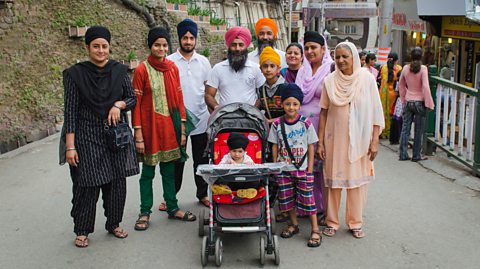
The Sikh family can be made up of nuclear familyA family unit consisting of two adults and any number of children living together. The children might be biological, step or adopted., stepfamilies, extended familyAny household which includes family members other than just parents and their children, such as cousins, grandparents or other relatives. and same-sex parents.
Many Sikhs live in multigenerational households.
Married women traditionally move into the homes of their husband’s family.
Family life is superior.”
Guru Granth Sahib 586

Teachings from the Gurus remind Sikhs of their roles within the family. Children should respect their parents: “It is a sin to quarrel over wealth and property with the parents who have given you birth and raised you,” (Guru Granth Sahib 1200).
It is the role of parents to teach their children about the faith and the spiritual way of life.
The stories of one’s ancestors make the children good children.”
Guru Granth Sahib 951
In Sikhism, the purpose of the family can include:
To procreate – “Doing deeds of love, the seed shall sprout, and you shall see your home flourish,” (Guru Granth Sahib 595). Many Sikhs interpret this as evidence that children are a blessing from God. Some Sikhs believe that they are contributing to God’s creation by having children and continuing the existence of society for future generations.
To provide stability and protection of children – Sikhs are encouraged to live as a family unit to provide and nurture children. Sikhism places great emphasis on the importance of the family in order to achieve the householder stage of life, by being parents and providers: “The faithful uplift and redeem their family and relations,” (Guru Granth Sahib Ang 3).
To preserve and grow the faith – Sikh children are often introduced to the faith through examples from their parents and extended family members. They are taught stories about Guru Nanak and the later Gurus. Parents therefore hope that their child becomes GurmukhGod-centred. Being focused on God and spiritual things. rather than ManmukhMan-centred. Being focused on oneself and material things.: “It is a Sikh’s duty to get his children educated in Sikhism,” (Rehat Maryada 16).
GCSE exam-style question
Describe reasons why Sikhs believe the family is so important.
Answers could include:
The Guru teaches that living the life of a householder, within a family is the most fruitful form of life. The guru saw those that worked hard and supported their family as more virtuous. Sikhs often live in extended families in one household. Parents and grandparents take care of the children, and as children grow up, they are expected to care for their parents as they become elderly. Married daughters traditionally move into the homes of their husband’s family.
Teachings from the Gurus remind Sikhs of their roles within the family. Procreation is important in Sikhism and as they grow up, children should respect their parents: “It is a sin to quarrel over wealth and property with the parents who have given you birth and raised you,” (Guru Granth Sahib 1200). The role of parents is to teach their children about their faith and the spiritual way of life within Sikhism.

Exam top tip
For your exam, it is important to know the definitions of key terms.
Take our quiz below to test your knowledge.
Issues of relationships key terms quiz
The Sikh wedding ceremony
For Sikhs the ideal marriage is that of one man and one woman because it is believed that as a couple comes together in marriage they then become one spirit.
They alone are called husband and wife, who have one light in two bodies."
Guru Granth Sahib 788
The whole extended families of both the bride and groom are often involved in the process of bringing a couple together in marriage and there can be many betrothal ceremonies beforehand to ensure that couple are right for each other.
The Sikh wedding ceremony
Marriage is known as Anand Karaj, the ceremony of bliss. It can take place in a home or in a gurdwara. It must be held in the presence of Guru Granth Sahib.
The bride and groom sit together as they are told about the responsibilities of marriage and given practical advice.
The marriage hymn known as the Lavan Guru Ram Das, and other teachings of the Gurus are read to help unite the couple before God.
O bride, decorate yourself, after you surrender and accept your husband Lord.”
Guru Granth Sahib 788
As teachings are read the couple walk around the Guru Granth Sahib showing that they accept the teachings and at the conclusion of the ceremony the couple will bow towards the Guru Granth Sahib to show that they are both in agreement with the marriage.
Marriage in Sikhism
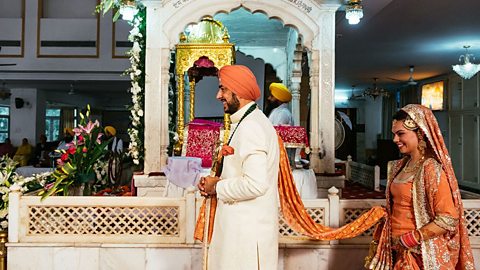
The nature and purpose of marriage
Sikhism teaches that marriage is a couple committing to follow the path of the Guru together for life. Nearly all the Sikh Gurus were married, and taught that marriage gives the opportunity to:
- procreateThe production of offspring; reproduction.
- Provide a safe environment for children
- Learn how to be less self-centred and selfish
As with khandeh-di-pahul In Sikhism this commonly refers to baptism. the Guru shows Sikhs that marriage also entails upholding duties and responsibilities. In the first round of the marriage ceremony, the Lord sets out His Instructions for performing the daily duties of married life.
……embrace the righteous conduct of Dharma, and renounce sinful actions.”
1st Lavan, Guru Granth Sahib 773
Sikhism teaches that marriage provides individuals with the opportunity not to be self centred, to extend their sense of self to include partners, in time future children and then society as a whole.
Recognize the whole of human race as one.”
Dasam Granth 51
The Nihang are known as Warrior Sikhs and often don't marry. They remove themselves from domestic life and spend much of their time in Gurdwaras and attending Sikh meetings.

Polygamy
Polygamy is the act of marrying multiple partners and is illegal in the UK. Sikhism does not accept the practise of polygamy and teaches monogamyThe practice of being married to or having a sexual relationship with only one person at a time.
GCSE exam-style question
Describe reasons why Sikhs believe that marriage is important.
Answers could include:
Many Sikhs believe that because most of the Gurus were married, they should follow in their example. They believe they should build families to educate children in the faith, which will help to preserve the religion: “It is a Sikh’s duty to get his children educated in Sikhism,” (Rehat Maryada 16).
Some Sikhs believe that a marital relationship will increase their understanding of God’s love for them and their families: "By the affair of this marriage, truth, contentment, mercy and faith are produced,” (Guru Granth Sahib 351).
Divorce and remarriage
Divorce is a legal process that ends marriage.
Sikhism teaches that marriage is a commitment which should last for a lifetime, because through marriage the two souls become one and should not split:
I have obtained God … the undying form as my spouse.”
Guru Granth Sahib 78
The community will offer help to prevent divorce and find solutions for the problems that occur in a marriage. The Guru Granth Sahib teaches: “If the husband and wife dispute, their concern for their children should reunite them,” (Guru Granth Sahib 143).
However, if all attempts to save the marriage fail, many Sikhs will accept divorce as a last resort.
Remarriage
The Rehat MaryadaThe Rehat Maryada is the only full list of rules to live by which has been authorised by the Akal Takht which is the main spiritual authority for Sikhs. teaches that no Sikh should marry a second time unless they have been widowed:
No Sikh should marry a second wife if the first wife is alive.”
Rehat Maryada 18:17
However, in certain circumstances of marital breakdown, the sangatThe local Sikh community. or the teachings of the Panj PyaareThe Five Beloved men who were special disciples of the last Guru, Godind Singh. can give permission to someone to re-marry:
Remarriage may be solemnized in the same manner as the Anand marriage.”
Rehat Maryada 11:18
Sikhs take this to mean that the remarriage service can be conducted in exactly the same way as if the couple were marrying for the first time.
Those who have been widowed can remarry if they choose to do so.
GCSE exam-style question
Describe reasons for Sikh attitudes on divorce.
According to religious teachings: “No Sikh should marry a second wife if the first wife is alive,” (Rehat Maryada 11:17). Most Sikhs believe that divorce should not be granted because they believe that two souls are united in a Sikh marriage and they should not be split by divorce.
However, in certain circumstances of marital breakdown, divorce is seen as acceptable by some of the Sikh community. Where appropriate, permission can be given to someone to re-marry: "Remarriage may be solemnized in the same manner as the Anand marriage,” (Rehat Maryada 11:18). Sikhs take this to mean that the remarriage services can be exactly the same as first marriage services and take place in a gurdwara.
In pictures: Marriage and the nature and purpose of family in Sikhism
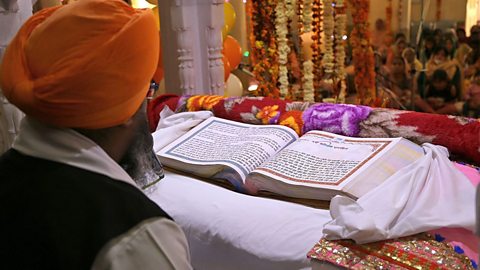
Image caption, The Guru Granth Sahib (Sikh scripture) is considered as a living Guru. The Guru Granth Sahib is the focal point of wedding ceremonies where the bride and groom commit to the Guru’s teachings together.

Image caption, A Sikh wedding is a religious and spiritual act, believed by Sikhs to be a sacrament. It brings a couple together, enabling them to become one spirit within two bodies.
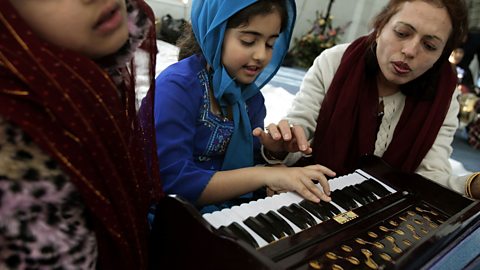
Image caption, Sikhs believe that family is an essential part of society. Families are encouraged to educate children in the faith to help preserve the religion.
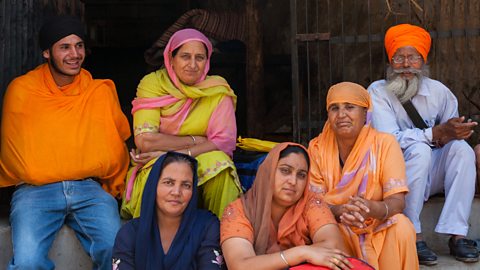
Image caption, Many Sikhs live in extended families in one household. Parents and grandparents take care of their children and grandchildren, and as children grow up, they are expected to care for their parents as they become elderly.
1 of 4
What does Sikhism teach about same-sex marriage?
Sikh teachings do not support the legal changing of marriage in the UK to support same-sex marriage. Sikh teachings emphasise the religion's belief that God intended marriage to be between heterosexualHeterosexual is the word to describe people who are sexually attracted to people of the opposite gender. couples.
In January 2005, an edictAn official proclamation, order or announcement of a law. of the Jathedar of the Akal TakhtThe head of the Sikhs worldwide. condemned same-sex marriage. Due to this, all gurdwaraSikh place of worship. are forbidden from conducting same-sex marriages:
The advice given by (Akal Takht) the highest Sikh temporal authority to every Sikh is that same-sex marriage is unnatural and ungodly, and the Sikh religion cannot support it.”
Manjit Singh Kalkatta
Due to the strong focus on equality in Sikhism, and the Gurdwara being open to all, some Sikhs believe that this edictAn official proclamation, order or announcement of a law. based on sexual orientation, is misguided.
In addition, the Gurus and the Rehat Maryada do not specifically mention homosexualityBeing attracted to people of one's own sex or gender.. Some Sikhs interpret this as evidence that if sexuality was an important consideration, then it would have been addressed within the Guru Granth Sahib.
He Himself creates, O Nanak; He establishes the various creatures. How can anyone be called bad?”
Guru Granth Sahib 1238
GCSE exam-style question
Describe reasons for Sikh attitudes on same-sex marriage.
Answers could include:
Many Sikhs see the Guru Granth Sahib as encouraging of heterosexual marriage. The joining of man and woman in marriage results in procreation, which is itself a manifestation of the divine as the ‘Creator’: “The Lord Himself is your mother, and He Himself is your father; He created the created beings, and revealed the world to them,” (Guru Granth Sahib 921).
However, some Sikhs value the love and commitment of couples who wish to unite, whatever their gender, and respect their desire for equal rights. These Sikhs believe that the lifestyle encouraged by the Gurus, can be developed by two members of the same gender: “He Himself creates, O Nanak; He establishes the various creatures. How can anyone be called bad?” (Guru Granth Sahib 1238).
Sex outside marriage
Sikhism teaches that sexuality is a gift from God and that it should only take place in a marriage. Therefore, the Sikh religion teaches that sex before marriage and cohabitation is wrong.
They are not said to be husband and wife, who merely sit together. They alone are called husband and wife, who have one light in two bodies.”
Guru Granth Sahib 788
The Rehat Maryada states that sex before marriage is strictly forbidden. It states that if a sexual act occurs outside marriage, then the couple cannot be true Sikhs. It is part of the KurehatThe Sikh code of conduct. that members of the KhalsaThe Sikh community, literally 'the community of the pure'. Refers particularly to initiated Sikhs. cannot break.
For an instant of sexual pleasure, you shall suffer in pain for millions of days.”
Guru Granth Sahib 403
Adultery
Kaam is one of the five ‘thieves’ in Sikhism, described as lust or desire. A devout Sikh aims to control the hold kaam has over them and resist its power.
adulterySexual intercourse between a married person and a person who is not their spouse. is seen as giving in to kaam and religious betrayal, as marriage is gifted by God.
The blind fool abandons the wife of his own home and has an affair with another woman.”
Guru Granth Sahib 1165
Contraception
For many Sikhs, God’s purpose for marriage is to have children. Many Sikhs believe they should follow the example of the human Gurus, who had large families. Children are seen as a gift from God:
A child is born when it pleases God.”
Guru Granth Sahib 921
However, there is no guidance on contraception in the Guru Granth Sahib or the Rehat Maryada, so it is not forbidden. This means that married couples are free to decide whether or not to use contraception.
Some Sikhs recognise that there are times when bringing a child into the world would be irresponsible and the Guru Granth Sahib suggests that God does not intend humans to suffer, therefore contraception can be considered acceptable.
Some Sikhs believe that life begins at conception, so ethical considerations on how the contraception works are taken into account. This can influence the type of contraception Sikhs believe to be acceptable.
GCSE exam-style question
Describe reasons for Sikh attitudes to the use of contraception.
Answers could include:
For many Sikhs, God’s purpose of marriage and sex is to have children and therefore they should follow the example of the human Gurus, who had large families: “You were cast into the womb, by the Lord’s command,” (Guru Granth Sahib 74).
However, neither the Guru Granth Sahib nor the Rahit Maryada have specific guidance about the use of contraception. This means that married couples can decide whether to use contraception, so that they can have a loving physical relationship: "My Son, so long as there is life in your body, you promise to enhance love with your own wife," (Guru Gobind Singh Ji, Dasam Granth 836).
The roles of men and women
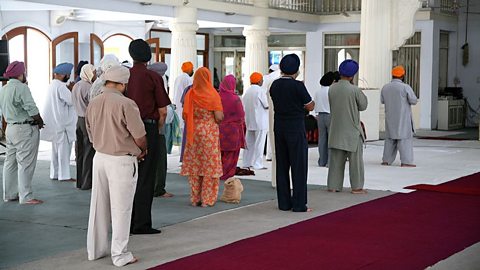
In Sikhism, men and women are seen to be equal before God and equality is emphasised both in worship and in family life.
Many Sikhs believe in the oneness of humanity. This is the belief that all humans are equal because they were all created by God. Therefore, Sikhism is opposed to discrimination in any form. Guru Nanak (1469-1539)The founder of Sikhism and the first Guru. Considered to be a religious innovator. taught that all different religions and races should live in harmony.
Look upon all with the single eye of equality; in each and every heart, the Divine Light is contained.”
Guru Granth Sahib 599

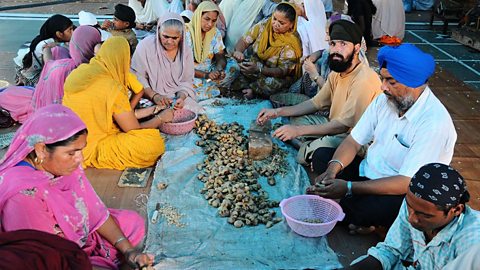
As Sikhism teaches the complete equality of men and women, most Sikhs believe that women should have equal rights in religion. Guru Nanak taught that man and woman are to be seen as two halves of a whole: "Woman is man’s other half," (Bhai Gurdas, Sikh theologian).
Guru Amar Das appointed women as Sikh preachers and it is believed that Mata Sahib KaurA wife of Guru Gobind Singh who proclaimed her as the Mother of the Khalsa (pure ones). mixed the amritMeaning 'nectar' - A sanctified sugar and water mix used in religious ceremonies. for the very first initiation ceremony.
In a gurdwaraSikh place of worship., women and men pray together and sit on the same floor to eat. Both men and women can work, lead congregations and be educators.
Guru Nanak was a strong advocate for women's rights. During Guru Nanak's time (1469-1539), women were seen as less than men, and were expected to obey their husbands and remain in the home. Guru Nanak was against this view. He believed that women should be treated equally as, without women, men would not exist:
In a woman, man is conceived, From a woman he is born … From a woman a woman is born. None may exist without a woman.”
Guru Granth Sahib 473
GCSE exam-style question
Describe reasons for Sikh attitudes to gender equality.
The Guru Granth Sahib teaches that God is neither male or female, and because humanity was created by God, all people must be treated the same. Sikhism is therefore opposed to gender discrimination in any form. Many Sikh's believe that equality should also extend to religious duties and practices. Guru Nanak taught: "Among all the women and the men, God's essence is pervading," (Guru Granth Sahib 223).
Many Sikhs believe that men and women both have a important part to play in society, and that the joining of men and women in marriage which results in procreation, is itself manifestation of the divine as the ‘Creator’, the ‘mother’ and the father’: “The Lord Himself is your mother, and He Himself is your father; He created the created beings, and revealed the world to them,” (Guru Granth Sahib 921).
Sikhism scripture quiz
Issues of relationships Sikhism quotes
1 of 5
![“The family life [is] ideal and superior of all the religions.” Kabit Swaiyye 376 (Bhai Gurdas ji)](https://ichef.bbci.co.uk/images/ic/480x270/p0hj3w6r.png)
